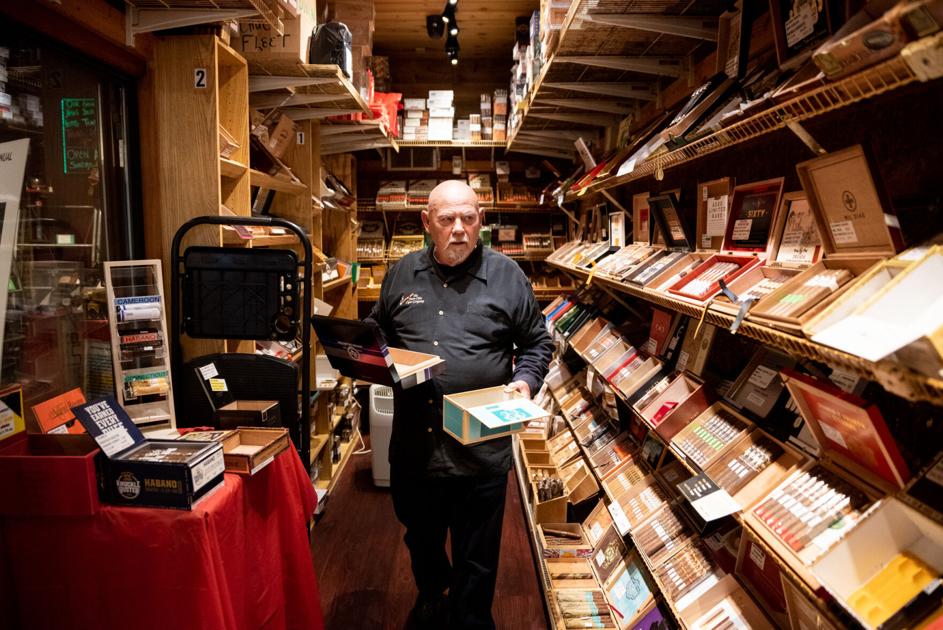Matt Drobney stacks merchandise as high as he can in his stockroom. Drobney and his wife Pamela own The Happy Eggplant Gourmet Food and Kitchen Shoppe in Hermitage, and he had the foresight to order Christmas merchandise in March.
HERMITAGE — With the holidays looming, Matt Drobney has reason to smile, and not just because of the name of his store.
Drobney and his wife Pamela own The Happy Eggplant Gourmet Food and Kitchen Shoppe in Hermitage. When they heard in March about potential problems in obtaining gourmet food ingredients and kitchen supplies due to issues in the supply chain, the couple began ordering items for Christmas almost before spring arrived.
“And some didn’t arrive until September and October,’’ Drobney said. “And we made big orders. That’s why our stock closets are so full.’’
There are a couple of empty spots on shelves at The Happy Eggplant Gourmet Food and Kitchen Shoppe in Hermitage. But the owners are well stocked for the Christmas shopping season as they bought early. They’re luckier than many as the global supply chain mess is hurting businesses ranging from steelmakers to retailers.
At The Happy Eggplant, there are only a few empty spots on shelves with hopes those products will soon arrive.
“We’re lucky,’’ Drobney said. “There’s lots of stores out there that will be hurting for supplies.’’
Since consumer demand began emerging from the COVID-19 pandemic, the world’s supply chain has been stretched to the breaking point. Short supplies and major shipping delays have socked almost every business sector — and it’s not going away for awhile, said Joe Joseph.
Joe Joseph, general counsel and senior executive vice president of international trade and customs.for Dalko Resources in Sharpsville, walks through a company warehouse. Brokering transportation services worldwide, Dalko is seeing skyrocketing price increases, Joseph said. Rising transportation costs are being passed on to consumers and businesses alike, Joseph said.
Joseph, general counsel for Dalko Resources in Sharpsville, also serves as the company’s senior executive vice president of international trade and customs. The company offers worldwide transportation services for a slew of business ranging from apparel to railroads.
Joseph said those costs have skyrocketed over the past three years. The cost of shipping a standard cargo container by boat from China to the United States, once $4,000, has increased to $30,000 over that period.
“If you’re wondering why we’re seeing inflation creeping into our economy this is the reason,’’ he said. “Businesses have to pass on their transportation costs.’’
How did the situation got to this point?
Parts serving a variety of industries are warehoused at Dalko Resources Sharpsville operations. The company also offers freight transportation, supply chain and distribution services.
The congestion of major U.S. ports had been building before the pandemic. and in recent years ocean carriers — where only 10 companies control 85% of the business — were reducing their capacity, Joseph said. The pandemic fractured an already fragile system.
“E-commerce blew things apart,’’ he said. “When COVID caused people to stay at home, there was a surge in online buying.’’
Joseph said any examination of supply chain issues must consider factors in China, the major supplier of goods imported into the U.S. A downturn in the Chinese economy and the pandemic there forced manufacturers to close. When U.S. consumers piled on with an insatiable demand, the system became clogged.
What’s more, the American worker shortage reduced desperately needed manpower for the transportation industry. East Coast ports also are hurting, Joseph said, and there’s labor shortages elsewhere.
Bob Hamelly stocks shelves with cigar boxes at the Penn-Ohio Cigar Company in Sharon.
George Joseph, who is not related to Joe Joseph, agrees.
Owner of The Penn-Ohio Cigar Co. in downtown Sharon, George said he has popular cigars on back order from suppliers in Central America.
As the pandemic spread major cigar producing countries like Honduras and Nicaragua closed cigar operations and laid off workers — with many still remaining off the job.
“Their government shut them down,’’ George Joseph said. “Nations like this don’t have lobbyists like we do to get a government to change their mind.’’
Even cigar boxes are in short supply. and that’s important to his customers.
“We sell cigar boxes because people love them,’’ he said.
Transportation problems dealt another body blow to George Joseph’s business.
“Shipping is the big thing,’’ he said. “It’s got everyone’s backs against the walls.’’
The supply chain problem isn’t limited to retail. For American manufacturers, it’s a double whammy, literally hitting them coming and going.
Not only do manufacturers face obstacles getting raw materials, but shipping finished products to customers is another nightmare. NLMK Pennsylvania fits that category.
NLMK’s Farrell steel plant relies on overseas slabs delivered to its factory, where they are rolled into steel coils. At times, slab deliveries have been a struggle, said Bob Miller, NLMK Pennsylvania’s president.
“We’re turning to everyone we can think of to move our products,’’ Miller said. “Companies like Norfolk Southern (Railway) are saying they’re already at full capacity and there’s nothing extra out there.’’
The trucks are running at capacityk too. Marc Buskirk, vice president of sales for Yourga Trucking, said the Wheatland company is beating the bushes to find new drivers.
“A couple of years ago I thought it was hard to get new drivers,’’ Buskirk said. “I long for those days — it’s even worse now.’’
Attempts to tweak the system are underway. Drivers of commercial vehicles must be at least 21 to travel among two or more states. U.S. Rep. Mike Kelly, R-16 District, Butler, and other members of Congress have urged U.S. Transportation Secretary Pete Buttigieg to reduce the age to 18.
“It underscores the need to get product moving once its been delivered to our ports as quickly as possible,’’ said Matt Knoedler.
For Dalko’s Joe Joseph, the supply chain problems are especially frustrating. He’s been ringing a warning bell on the issue for years.
“It’s amazing how we got to this point,’’ he said.


